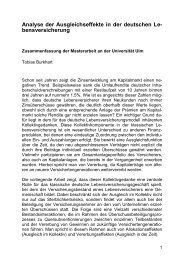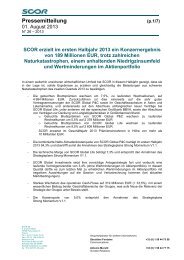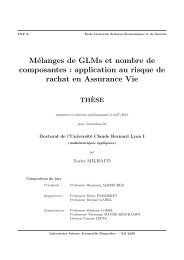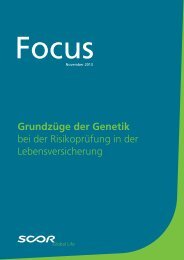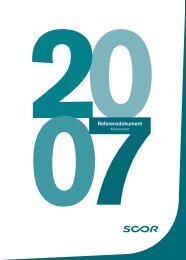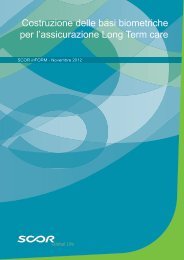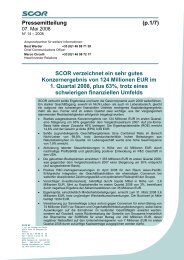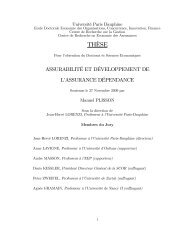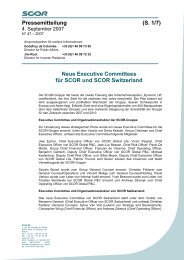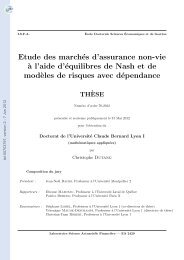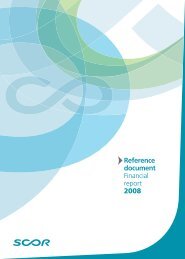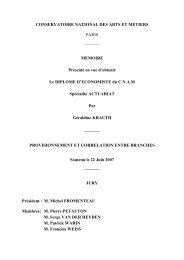4.4 Legal risk - Scor
4.4 Legal risk - Scor
4.4 Legal risk - Scor
Create successful ePaper yourself
Turn your PDF publications into a flip-book with our unique Google optimized e-Paper software.
(d) Receivables from non-(re)insurance debtors<br />
SCOR is exposed to a credit <strong>risk</strong> in the event of a payment default by a debtor not linked to the Group by a reinsurance or<br />
retrocession treaty. This can be, for instance, advances to providers, social security contribution collection agencies or<br />
states, or loans to employees, etc.<br />
The <strong>risk</strong> of losing all or part of receivables the Group owns could have a material adverse impact on its business, present<br />
and future revenues, net income, cash flows, financial position, and potentially, on the price of its securities.<br />
(e) Cash deposits at banks<br />
SCOR is exposed to the <strong>risk</strong> of losing all or part of any cash deposited with a retail bank in the event such a bank is no<br />
longer able to honor its commitments (e.g., following liquidation).<br />
The current main <strong>risk</strong> for the Group is the significant concentration of deposits in a small number of banks. This <strong>risk</strong> is a<br />
direct result of the selection of the most stable banks.<br />
The inability of one or several banks to return its deposits to SCOR could have a material adverse impact on its business,<br />
present and future revenues, net income, cash flows, financial position, and potentially, on the price of its securities.<br />
Concentration <strong>risk</strong> is mitigated by defining counterparty exposure limits. Furthermore, SCOR selects bank counterparties<br />
according to their rating and quality of their credit. SCOR also considers the public assistance (e.g., loans, guarantees of<br />
deposits, nationalizations) certain banks may benefit from during the financial crisis, as they are important in the economy of<br />
their country.<br />
(f)<br />
Deposits with custodians<br />
As part of the management of its investment portfolio, SCOR deposits the securities it owns with a number of approved<br />
custodians. In the case of default of a custodian, depending on the local regulation applicable to the custodian, all or part of<br />
these securities could become blocked.<br />
The <strong>risk</strong> of losing all or part of securities the Group owns could have a material adverse impact on its business, present and<br />
future revenues, net income, cash flows, financial position, and potentially, on the price of its securities.<br />
(g) Credit & surety<br />
SCOR is exposed to credit <strong>risk</strong> through its Credit & Surety portfolio. By reinsuring the liabilities of its clients, which are<br />
insurers providing surety bonds and/or credit insurance policies, the Group must indemnify its ceding companies, for the<br />
portion that it reinsures, in the event of the default of companies on which its ceding companies are exposed.<br />
This business is situated in many countries, and across a diverse range of <strong>risk</strong>s, cedants and activity sectors.<br />
SCOR’s Credit & Surety business does not cover either credit default swaps (CDS) or real estate loans, notably in the U.S.,<br />
nor is it exposed to the various U.S. credit “monoliners” or “guarantors.”<br />
SCOR’s underwriting policy is particularly prudent in this area. SCOR specifically monitors its main exposures in this sector.<br />
In addition, SCOR benefits from the expertise of its specialized cedants in terms of <strong>risk</strong> prevention, since the cedants<br />
continuously adjust their own exposure levels based on changes in the financial strength of the debtors they are insuring.<br />
Multiple defaults of companies (or in the event of the default of a major company) on which the ceding companies are<br />
exposed could have a material adverse impact on SCOR’s business, present and future revenues, net income, cash flows,<br />
financial position, and potentially, on the price of its securities.<br />
(h) Future profits of Life reinsurance treaties<br />
Credit <strong>risk</strong> on future profits from Life reinsurance policies arises from two <strong>risk</strong> factors.<br />
First of all, the payment of future profits expected under Life reinsurance contracts necessarily implies that the cedant is<br />
solvent: for this reason, SCOR <strong>risk</strong>s a reduction in the value of its portfolio of Life contracts in the event of a deterioration in<br />
the financial strength of the cedant. In such a case, it is possible that the VOBA and deferred acquisition costs (“DAC”) may<br />
as a consequence need to be written down and as a consequence, its shareholders’ equity would be reduced accordingly.<br />
In particular this affects the US book of business acquired in the course of the Transamerica Re acquisition. The majority of<br />
the former Transamerica Re’s reinsurance contracts flow into SCOR via retrocession from Aegon companies. An AEGON<br />
insolvency might lead to premiums from clients no longer being passed on to SCOR, and thus potentially impair the value of<br />
business acquired (“VOBA”).<br />
Secondly, a reduction in the value of future profits could arise from a massive unexpected lapsation of policies following a<br />
deterioration of the cedant’s financial rating or an event which has a negative effect on SCOR’s image.<br />
The Group, therefore, has exposure to a credit <strong>risk</strong> linked to the insolvency and to the image of its cedants, which, if this<br />
were to occur, could have an adverse impact upon its business, present and future revenues, net income, cash flows,<br />
financial position, and potentially, on the price of its securities.<br />
279



